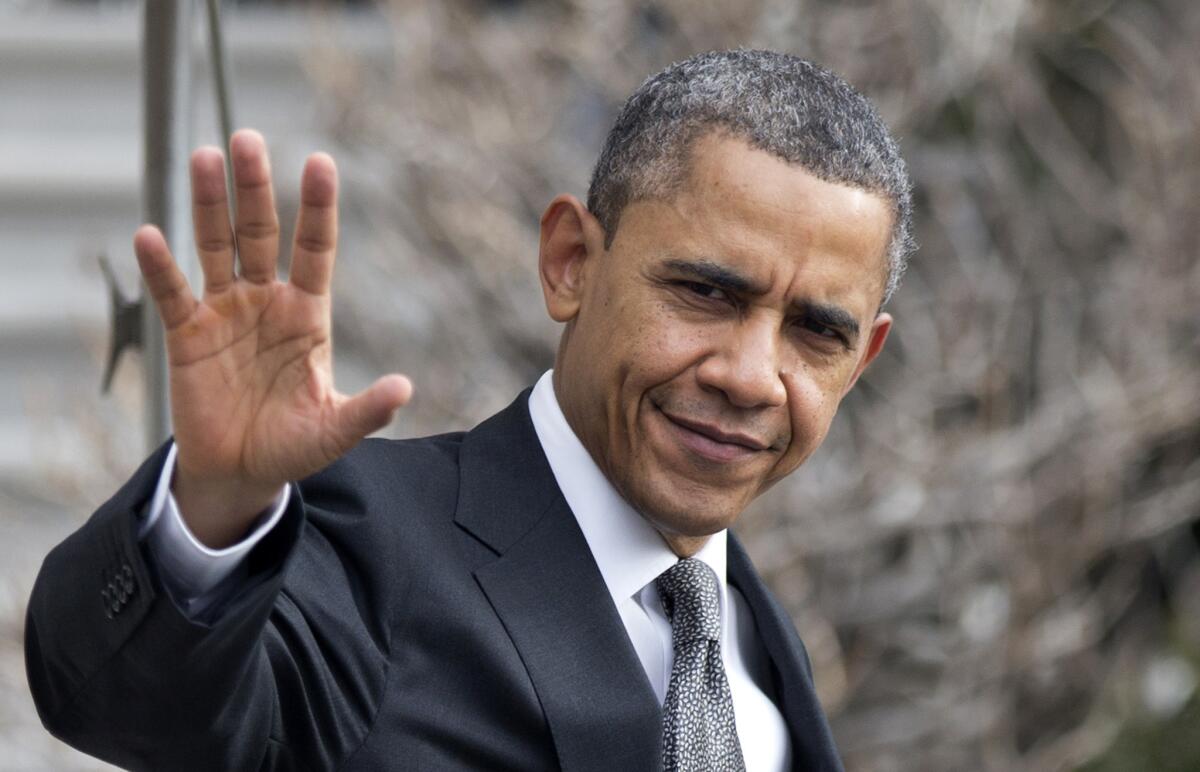McManus: President Obama 3.0

- Share via
We got a good long look at the second-term edition of Barack Obama last week, and he’s sounding more like Bill Clinton every day.
It’s not all that surprising. Over the last two years, Obama has turned repeatedly to Clinton for counsel. And Obama was a target of Clinton’s advice even before he asked for it. In a 2011 book and a series of public appearances, the former president laid out a polite but biting critique of Obama’s first-term stumbles.
Warning No. 1, coming from the man who proclaimed (in his 1996 State of the Union message) that “the era of big government is over,” was that Obama shouldn’t fall into the trap of defending big government.
TRANSCRIPT: 2013 State of the Union
Sure enough, in Obama’s State of the Union speech last week, we heard this: “It’s not a bigger government we need, but a smarter government.”
Obama’s rhetoric still aims high; he hasn’t given up all hope of transforming American politics. But his concrete proposals these days are smaller and more Clintonian, a necessary adjustment in the face of entrenched Republican opposition.
In his State of the Union address, Obama promised to revive manufacturing jobs, but the major details turned out to be modest: long-proposed tax changes to make “offshoring” more expensive and $1 billion to create “innovation institutes.”
He vowed to repair crumbling infrastructure but suggested that, with little money available, he’d settle for fixing the country’s most dangerous bridges.
He called for universal preschool education, but the programs he offered turned out to be not quite universal and mostly aimed at spurring states to act.
In a sense, we’re seeing the third version of the Obama presidency.
Obama 1.0 was the ambitious Obama of 2009, swept into office in a landslide amid economic crisis. That expansive Obama tackled everything at once — a giant economic stimulus program, a healthcare law and financial reform — and intended to pass immigration reform and climate-change legislation too.
But that agenda turned out to be too ambitious, even with both houses of Congress in Democratic hands. When the economy didn’t spring back to life in the ill-named “Recovery Summer” of 2010, voters revolted and delivered the House of Representatives to the tea party Republicans.
Obama 2.0 tried to draw lessons from those setbacks. If voters were worried about the deficit, he’d work on the deficit. He spent much of 2011 trying to negotiate a “grand bargain” over spending and taxes with House Speaker John A. Boehner (R-Ohio), but they couldn’t find middle ground. Many Republicans didn’t want a compromise; they simply wanted to turn Obama out of office.
So, by the end of 2011, we began to see Obama 3.0: a more confrontational president bent on reestablishing a popular mandate for his core policies, beginning with tax hikes on the wealthy. That Obama, the Obama of last year’s election campaign, turned out to be pretty skilled at his job, winning convincingly in November.
Now, as the second term gets under way, Obama is still traveling around the country campaigning for modest new government programs and against Republican obstruction. Last week, he went to North Carolina to talk about manufacturing, to Georgia to talk about preschool education and to Illinois to talk about gun control and the minimum wage.
Does the president really expect to win a $9 minimum wage, universal preschool education and a ban on assault weapons despite the GOP-held House? No.
But those are proposals that please not only confirmed Democrats but many swing voters as well. Provoking Republicans into opposing them helps Obama cast the GOP as a party of cranky conservatives — another tactic at which Clinton excelled.
There’s an irony, of course, in the echoes of Bill Clinton that turn up in Obama’s strategy today. In the race for the Democratic presidential nomination in 2008, Obama not only ran against Hillary Rodham Clinton; he dismissed her husband’s tenure in the White House as unimpressive.
“Ronald Reagan changed the trajectory of America … in a way that Bill Clinton did not,” Obama said then. Reagan “put us on a fundamentally different path, because the country was ready for it,” Obama said, a circumstance he clearly thought was also the case in 2008.
But Obama 3.0 is a more practical man. He no longer talks brashly about transforming American politics, even though his 2012 campaign may turn out to have done so.
Bill Clinton’s second term wasn’t an unqualified success; he spent much of his tenure battling personal scandals and impeachment. (Somehow, Obama appears unlikely to follow that pattern.) But Clinton left office with a solid list of accomplishments, high popularity and a healthy economy. That kind of legacy is another thing Obama would like to emulate.
Follow Doyle McManus on Twitter @DoyleMcManus
More to Read
A cure for the common opinion
Get thought-provoking perspectives with our weekly newsletter.
You may occasionally receive promotional content from the Los Angeles Times.







